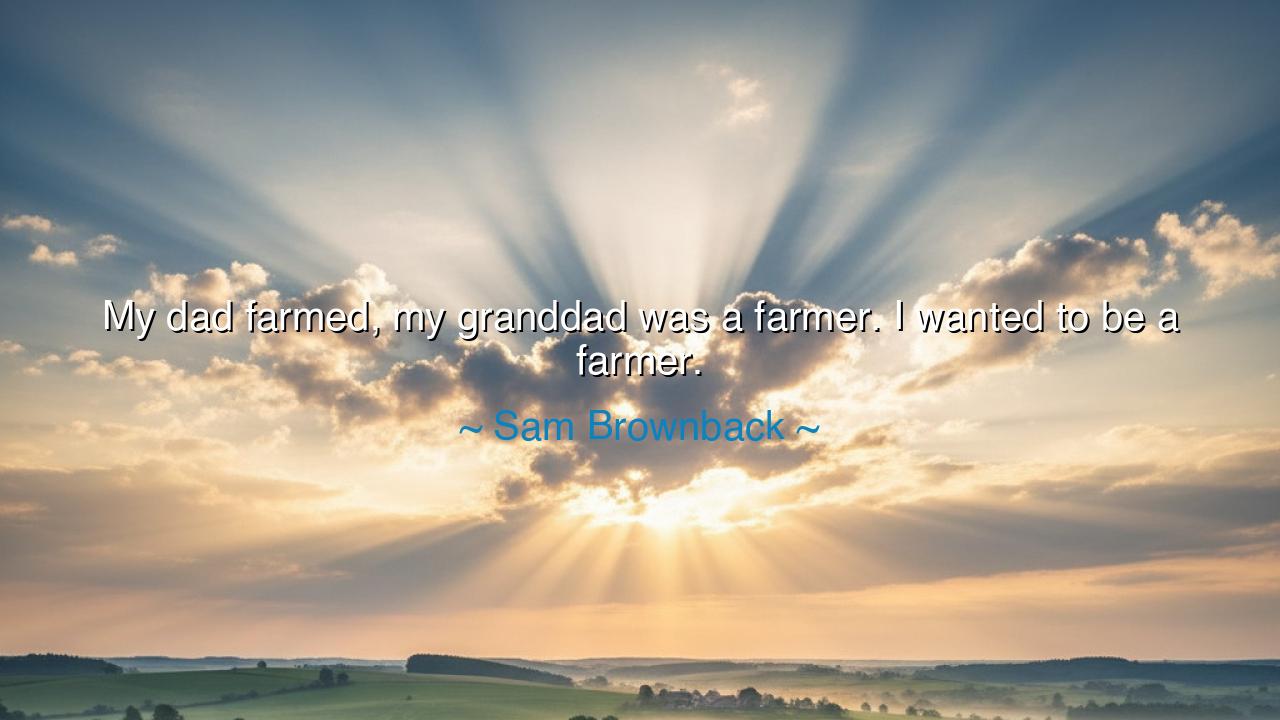
My dad farmed, my granddad was a farmer. I wanted to be a farmer.






In the quiet strength of lineage and the rhythm of the earth, Sam Brownback once said: “My dad farmed, my granddad was a farmer. I wanted to be a farmer.” Though spoken with simplicity, these words resound with ancient truth — the call of heritage, the pull of the soil, and the deep reverence for labor that sustains life. In them lies not only the story of one man’s yearning but the eternal bond between generations, the sacred continuity of work, wisdom, and devotion to the land. To farm is not merely to till the ground; it is to join in the oldest covenant between humankind and creation — to feed, to nurture, to endure.
To the ancients, the farmer was a figure of honor and virtue. Before the rise of empires, before the song of the sword, it was the farmer who gave life to nations. The Romans held that the truest citizen was he who worked the fields, for his hands were clean of deceit, and his heart was humble before the gods. Cincinnatus, once a general, laid down his weapons to return to his plow, choosing service over glory. His example lived for centuries as the model of integrity — that greatness springs not from conquest, but from labor. So when Sam Brownback honors his father and grandfather, he joins this lineage of humble strength — men who find purpose not in fame, but in the patient faith of the soil.
The words also speak to the power of inheritance, not merely of blood, but of spirit. A father’s labor becomes a lesson; a grandfather’s endurance becomes a compass. The boy who watches his elders rise before dawn and bend to their work learns more than technique — he learns gratitude, perseverance, and reverence for creation. For the land does not yield to haste; it teaches patience through the seasons. The farmer becomes both student and servant of nature, learning that the same hand that sows must also wait. Thus, the child who says, “I wanted to be a farmer,” is not speaking of ambition, but of belonging — the desire to continue the sacred chain of duty and devotion.
Consider the story of George Washington, the first president of the United States, who, though crowned by history as a leader and general, found his truest peace as a farmer at Mount Vernon. After war and victory, he returned to the soil, to the quiet work of cultivation. He believed that the strength of a nation rested not on its armies or wealth, but on its farmers — men and women who, by their steady labor, nourished both land and people. His life embodied the truth that the spirit of the farmer is the spirit of civilization itself: self-reliant, humble, and enduring.
When Brownback recalls his father and grandfather, he also acknowledges the deeper wisdom of continuity — that our ancestors’ labors are the roots from which we grow. Modern life often pulls us away from these roots, promising comfort but leaving us adrift. Yet the soil still waits, as it always has, for those who will listen. The farmer’s way teaches us to cherish what is real — to sow kindness, to harvest patience, to honor what sustains us. Whether or not we till the literal ground, each of us is a farmer in spirit, cultivating the field of our days with deeds of care and love.
There is also humility in this confession. For in saying, “I wanted to be a farmer,” Sam Brownback reveals that true greatness does not lie in escaping our origins, but in understanding them. The man who remembers his roots walks with gratitude, knowing that his success was first plowed by the hands of others. His words remind us that no work is small when it is done with devotion, and no life is poor when it gives to others what the earth gives to all — sustenance, stability, and hope.
So let this teaching be passed on: Honor your roots, for they anchor you in the storms of life. Remember those who came before you — the fathers and mothers who labored not for glory but for love. Whatever field you work in — whether of soil, art, or thought — cultivate it with patience and pride. The spirit of the farmer lives in all who create, who nurture, who build.
Thus, the teaching concludes: the plow is a symbol of the soul’s endurance. The earth repays those who tend it with respect, just as life rewards those who live with humility and purpose. When Sam Brownback says he wished to be a farmer, he is not merely recalling a childhood dream — he is honoring a timeless truth: that to labor honestly, to care for what sustains us, and to walk in the footsteps of our forebears is the noblest path a human heart can choose.






AAdministratorAdministrator
Welcome, honored guests. Please leave a comment, we will respond soon